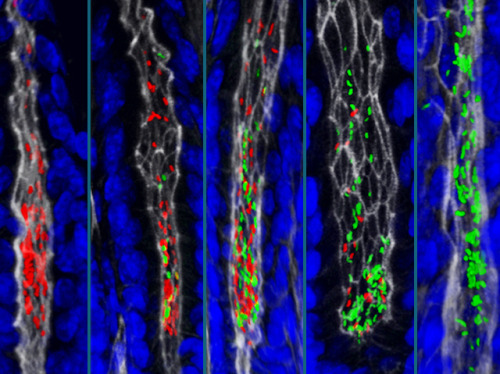
Controlling Colonisation
Every surface of your body, inside and out, is covered with bacteria. Most of the time they don’t do any harm, and so-called ‘good bacteria’ in places like the gut even help to keep us healthy. But excessive bacterial growth in the wrong place can lead to recurring infections and long-term health problems such as inflammation. One of the most serious conditions is stomach cancer, which can be caused by long-term infection with a type of bacteria called H. pylori. However, it’s a mystery how these bugs stay so long living in the acidic, slimy environment of the stomach, or how they cling on to the stomach lining as it is continually regenerated. By infecting mice with H. pylori labelled either red or green, scientists have discovered that the bacteria form close-knit colonies deep down in the glands within the stomach lining, undisturbed by outsiders and protected from harsh conditions.
Written by Kat Arney
- Image adapted from work by Connie Fung and colleagues
- Department of Microbiology and Immunology, Stanford University School of Medicine, Stanford, CA, USA
- Image originally published under a Creative Commons Licence (BY 4.0)
- Published in PLOS Biology, May 2019
You can also follow BPoD on Instagram, Twitter and Facebook
Archive link





Комментариев нет:
Отправить комментарий